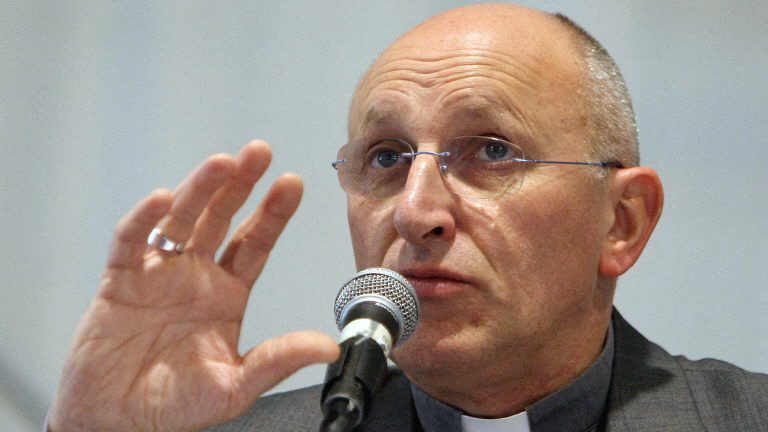
Fréjus-Toulon Bishop Dominique Rey
Photo: Eric ESTRADE / AFP
The diocese of Toulon in Provence, headed by Bishop Dominique Rey, has been under close surveillance by the Vatican since June 2022, when the pope decided to suspend all future priestly ordinations. Msgr. Rey has been accused of being too lenient in welcoming communities and managing the discernment of vocations, but also of being too favourable to traditional communities. A way out of the crisis is said to be in sight, with the retention of the bishop and the appointment of a coadjutor.
The diocese of Fréjus-Toulon, one of France’s leading providers of vocations to the priesthood, has been in a state of uncertainty since the abrupt decision taken in June 2022 to postpone all planned ordinations there. The papal decision was followed by an apostolic visit to the diocese in early 2023. Rome’s decision to put a stop to a diocese known for its attractiveness and dynamism in France and beyond caused a stir at the time, with the faithful asking many questions about the ultimate motives behind such a rare decision.
Gradually, beyond the rumours, a series of grievances against Msgr. Rey’s management emerged. He was criticised for an excessive welcome policy in his diocese, which may have led him to take in candidates for the priesthood who had been rejected elsewhere, or communities suffering from obvious canonical irregularities, or under investigation for various abuses. But many Catholics also saw in the severity of the disciplinary treatment inflicted on the diocese—a procedure without equivalent, even though there are obviously other dysfunctional dioceses—a ‘punishment’ for the traditional orientation of Bishop Rey’s pastoral work. Although he himself comes from the ranks of the charismatic Emmanuel community, he has been particularly benevolent towards the various communities faithful to the Tridentine liturgy that are flourishing, such as the Missionaries of Mercy in Toulon and the Little Sisters of Consolation in Draguignan.
For many months, the diocese has faced a painful wait, with no new instructions coming from Rome. The situation could be resolved, if we are to believe the information divulged by the newspaper Libération and analysed by Jean-Marie Guénois, head of the Religion section of Le Figaro, who is well informed on these matters. A month ago, the pope apparently decided to appoint a coadjutor bishop alongside Bishop Rey in the person of Bishop François Touvet, 58, currently bishop of Châlons-en-Champagne in the north of France.
The process of appointing a coadjutor bishop is a long-standing practice in the Church, although it has recently become less common. His role is to act as an assistant to the bishop in his office, and then to succeed him. Msgr. Touvet would thus assist Msgr. Rey during the four years that Msgr. Rey has left before reaching the age of episcopal retirement, at 75. Some see in this decision the hand of Cardinal Aveline, archbishop of Marseilles, close to Pope Francis and well aware of the delicate balances prevailing in this meridional diocese.
The choice of Msgr. Touvet would prove that the pope does not intend to disavow Msgr. Rey’s approach: the two men are similar, Msgr. Touvet being a dynamic prelate, close to the faithful and anxious to obtain pastoral results like the man he is preparing to assist. A military chaplain and chaplain to several scout movements, he knows how to speak to all audiences. The left-wing newspaper Libération describes him as an “assertive conservative from a military family”—which bodes rather well for the future. During the COVID pandemic, Msgr. Touvet distinguished himself by taking distinctive initiatives to ensure that his flock was not denied access to the sacraments, for example by instituting open-air Masses in car parks, based on the drive-in cinema model.
If this information is confirmed, it remains to be seen exactly how the duties of Bishop Touvet and Bishop Rey will be shared within the diocese. The office of coadjutor could be interpreted in different ways: as a means of ensuring a smooth transition between the two men, or as the coadjutor taking over the main functions, reducing the incumbent bishop to the status of an extra.
In any case, the choice of this procedure would have the immense merit of not disowning the Bishop of Toulon outright, and of allowing him to retire with his head held high, without being sacked—a result that is in itself a small victory for the man who had become one of the bêtes noires of the most progressive fringe of Catholics, both in France and in Rome.
